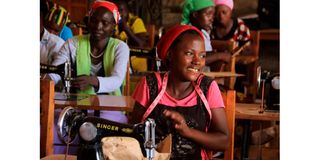Kakuma: New program helping refugee SGBV victims get justice

Pizrah Gloria, 17, a refugee from Burundi at a tailoring training at Kakuma refugee camp in 2017. UN Women and the Japanese government is helping girls and women in the camp, who are victims of SGBV to access justice.
What you need to know:
- A new program by UN Women seeks to ensure victims and survivors of SGBV in Kakuma Refugee Camp have access to justice.
- Women and girls in the refugee camp are highly vulnerable to rights violations.
- Since the project started in November 2021, 31 sexual violence related cases have so far, been taken to court.
In August last year, a Kenyan police officer accused of raping a South Sudanese in Kakuma Refugee Camp, was charged in court where he pleaded not guilty.
Kennedy Kamande, an officer attached to Kakuma Police Station was arraigned at the Lodwar Law Courts. The suspect had escaped from Lodwar precincts on July 22, when he was supposed to take a plea on the rape charges against him, before he was arrested on August 5 in Kandara, Murang'a County.
The court heard that on June 6, 2019, at Kakuma (iv) patrol base in Turkana West Sub-county, Mr Kamande jointly with another not before the court, he intentionally and unlawfully raped a South Sudan refugee woman, 40. The case is ongoing.
This is just one of the few cases on sexual violence against women and girls in Kakuma refugee camps that made it to court.
Snail pace justice
For years, victims and survivors of sexual and gender-based violence (SGBV) at the camp, majority of them women and girls, have always decried at failure to get justice.
They have complained of the snail pace of justice for cases filed in court, and failure for culprits to be apprehended and taken to court.
This is scenario is, however, bound to change following a new program that seeks to ensure victims and survivors of SGBV in the refugee camp have access to justice.
The new project dubbed the Leadership, Empowerment, Access and Protection in Crisis Response (Leap), a brainchild of UN Women, is helping girls and women in the camp, who are victims of SGBV to access justice.
Women and girls in the refugee camp are highly vulnerable to rights violations with frequent cases of SGBV occurring at unmanned water points, during firewood collection, or in the home.
Since the project started in November 2021, 31 sexual violence related cases have so far, been taken to court, with 20 ongoing, and 11 concluded. Some cases have led to conviction for rape or defilement.
Kakuma Hospital
The project, which is being supported by the Japanese government was initiated in 2018 and will run up to 2023.
According to UN Women, the Gender-Based Violence Support Centre, located in Kakuma Hospital, receives cases of rape and physical assault. On average, the centre receives 15-20 cases a month, mostly young girls.
One element of the project is to increase protection of vulnerable refugee and host communities in Kenya. The program has already started bearing fruit, with a man recently being jailed for defiling his niece.
On May 28, 2022, a three-year-old refugee girl from South Sudan received her long-awaited justice. Her uncle was imprisoned for life after sexually abusing her while she was under his care.
“One ruling in favour of a GBV survivor is a big win for women and girls, especially in the refugee community. We cannot tire, we have to continue the fight against sexual and gender-based violence,” said Idil Absiye, Women Peace and Security Specialist, UN Women Kenya.
Ian Rono, a magistrate at Kakuma Law Courts recounted how it was initially hard to crack the case.
Sexual related violence
“It was a very difficult case, since the child was very young. She refused to talk to the police and doctors.
“I decided to proceed with the case, and talked to her during the trial. It took over two hours, but luckily she talked to me. She told us everything," said Mr Rono.
It is, however, not just men who are causalities of sexual-related violence in the camp. Young boys are also targeted. Last year, there were 12 cases from men below 18 years.
Data from UNHCR indicates that Kakuma hosts more than 200,000 refugees with a high proportion of female-headed households.
The camp, which was created after thousands fled fighting in South Sudan - Africa’s longest-running civil war - also houses refugees from Angola, Ethiopia, Eritrea, the Democratic Republic of the Congo, Rwanda, Burundi and Uganda.





